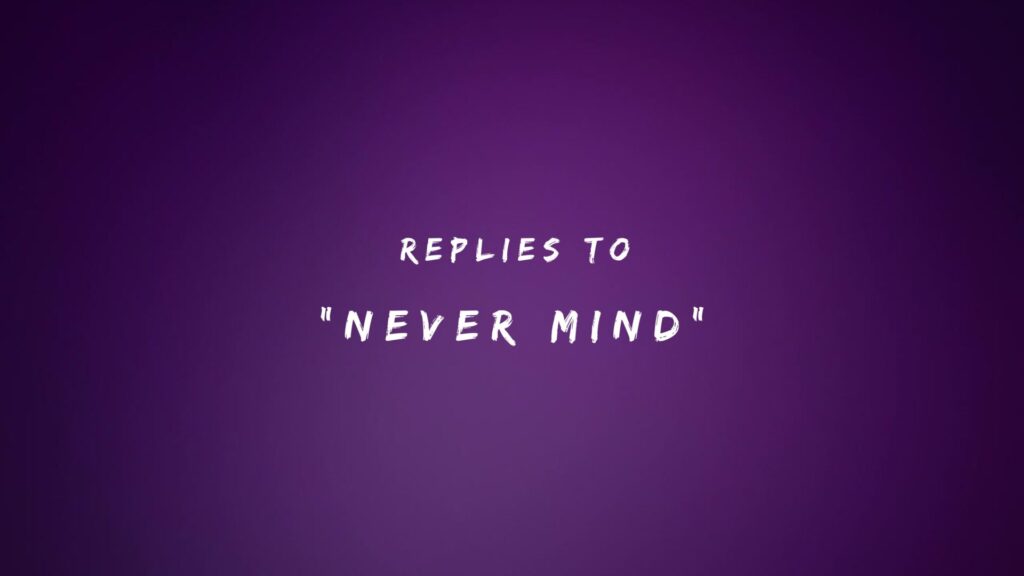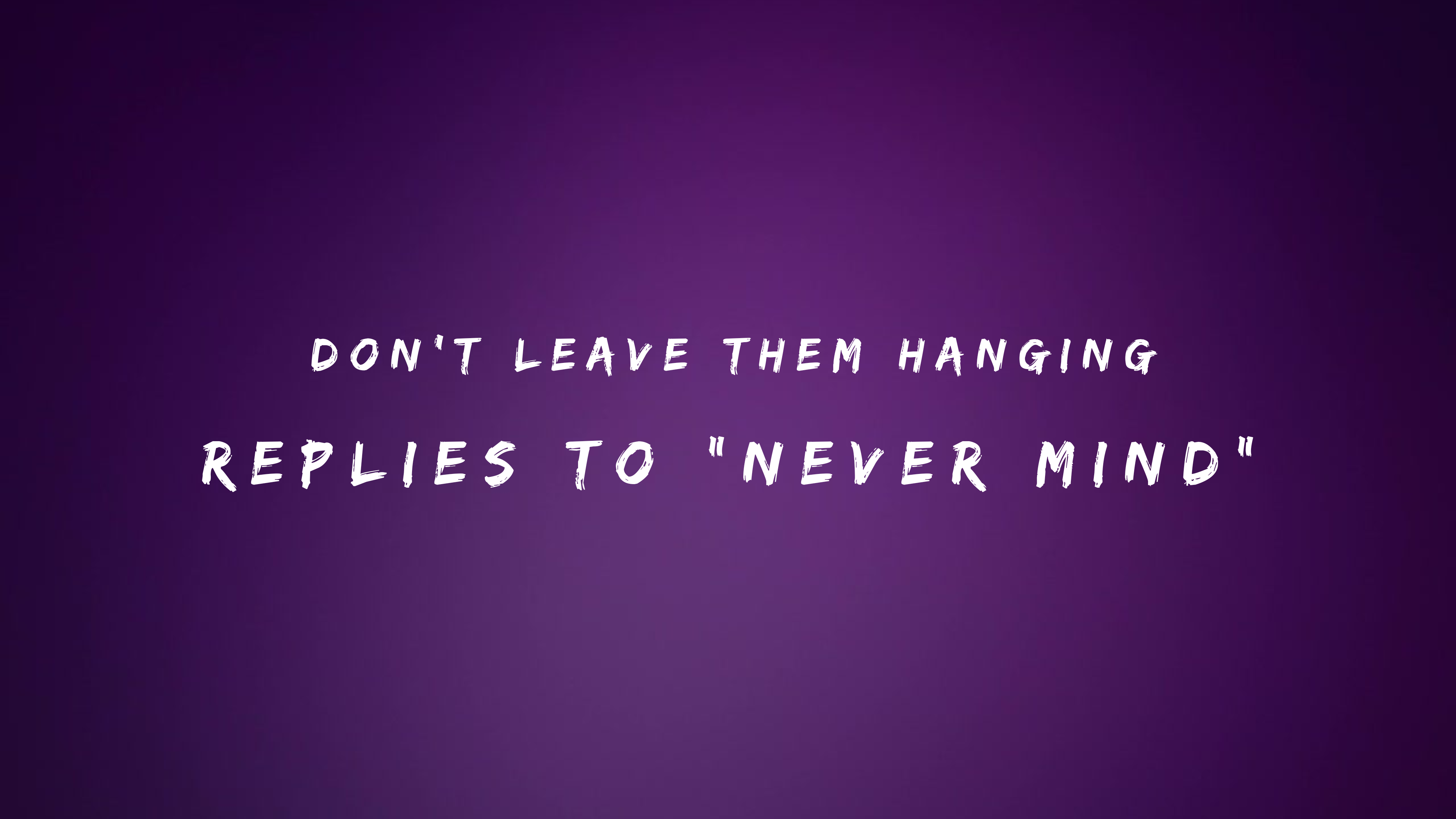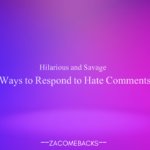Have you ever encountered a conversation where someone abruptly says, “Never mind”? That classic phrase can leave you hanging, scratching your head. But what does it mean? And more importantly, how should you respond? In this article, we’ll dive deep into “Never mind” nuances and explore its best replies.

150+ Replies to “Never Mind”
Dismissive Responses
- Fine, let’s drop it.
- No biggie.
- Okay, I am moving on.
- Forget it, then.
- If you say so.
- Doesn’t matter to me.
- I won’t push it.
- Whatever you decide.
- Sure, I’ll let it go.
- I can live with that.
Clarification Requests
- Can you tell me why?
- What made you change your mind?
- Are you sure you want to let it go?
- Was it something I said?
- Do you want to talk about it more?
- Please give me a hint.
- Is there a reason you’re backing out?
- What’s the main concern?
- Is this something we should revisit later?
- Was it really that unimportant?
Reassuring Replies
- It’s fine to change your mind.
- No worries, it happens to everyone.
- I understand; we can skip it.
- It’s okay; we don’t have to discuss it.
- Take your time; no pressure.
- I’m here whenever you want to share.
- Don’t stress about it; it’s all good.
- I respect your decision.
- You don’t have to explain if you don’t want to.
- It’s perfectly normal to feel that way.
Curious Responses
- What were you thinking before?
- Did something happen to change your mind?
- Is there something you’d prefer to talk about?
- What’s your reasoning behind that?
- I’m curious why it’s not important now.
- Can you share what prompted that decision?
- Was it something specific that made you back out?
- What do you want to discuss instead?
- Do you feel comfortable sharing your thoughts?
- Is there another perspective you want to consider?
Humorous Replies
- Did the topic get shy?
- So, we’re playing ‘Forget it’ now?
- Did I scare it away?
- That topic must be a magician!
- Well, that was quick!
- Is it too spicy for the chat?
- Did it just hit the ‘delete’ button?
- That topic took a nap!
- Did the subject decide to go on vacation?
- Is it hiding from us now?
Supportive Responses
- I’m here if you ever want to talk.
- It’s okay; take your time.
- Let me know if you need support.
- Whenever you’re ready, I’m all ears.
- Your feelings are valid; I understand.
- No pressure; we can talk later.
- I appreciate your honesty.
- I’m just a message away if you change your mind.
- It’s alright to feel that way; I’m here for you.
- You’re not alone; we all have those moments.
Frustrated Responses
- You can’t just drop it like that!
- That’s frustrating!
- Come on, don’t leave me hanging!
- Why bring it up if you’re going to ignore it?
- I thought it was important to you.
- You started this conversation!
- Seriously? You got me curious now!
- It’s hard just to let that go!
- Why do you keep changing your mind?
- This is so confusing; just say what you mean!
Indifferent Replies
- Alright, whatever.
- If that’s how you feel, fine.
- Okay, I won’t press it.
- Not a big deal to me.
- Sure, let’s just move on.
- Fine by me.
- Doesn’t bother me either way.
- Whatever you want to do.
- That’s your choice.
- Cool, I can drop it.
Empathetic Replies
- I understand; sometimes, it’s hard to talk.
- I can see why you’d feel that way.
- It’s okay to feel unsure about it.
- I get it; we all have those moments.
- Your feelings are completely valid.
- I’m here for you whenever you’re ready.
- I can relate; it happens to everyone.
- I appreciate your honesty about this.
- It’s normal to change your mind.
- Let me know if you need to talk about it later.
Playful Responses
- Did the topic take a vacation?
- Is this a ‘game over’ moment?
- So, it’s a mystery now?
- Are we playing hide and seek with this topic?
- Did it get lost on the way?
- Was it too hot for the conversation?
- Did it just enter witness protection?
- Is it a secret now?
- Is the topic shy, or is it just playing hard to get?
- Did it just decide to ghost us?
Reflective Responses
- What changed your mind?
- It’s interesting how perspectives shift.
- That’s a thoughtful decision.
- I can see why you might reconsider.
- Sometimes, stepping back is the best choice.
- It’s good to reflect before continuing.
- I appreciate you thinking it over.
- It’s valid to rethink things as we go.
- What do you think led to that change?
- It’s wise to pause and reconsider.
Reassessing Responses
- Should we talk about it later?
- Maybe it’s worth revisiting?
- What do you feel now about that topic?
- Are you sure you want to leave it behind?
- Let’s think this through together.
- Would it help to talk about your feelings?
- Is there anything new you want to add?
- Should we give it another shot?
- Do you feel like it’s still relevant?
- Is there a different angle we could explore?
Apologetic Replies
- I’m sorry if I pressured you.
- I didn’t mean to make you uncomfortable.
- I apologize if I misread the situation.
- I didn’t intend to push too hard.
- I’m sorry for bringing it up.
- My bad for not recognizing your feelings.
- I didn’t realize it was bothering you.
- I hope I didn’t upset you.
- I’ll be more mindful next time.
- I appreciate your patience with me.
Encouraging Responses
- It’s okay to take your time with this.
- Whenever you feel ready, I’m here.
- You don’t have to rush; it’s all good.
- Take your time; we can come back to it.
- I’m here to support you, no matter what.
- You can always share when you feel comfortable.
- Your pace is perfectly fine.
- I believe in you; you got this!
- Feel free to open up whenever you’re ready.
- Just know that I’m here for you, always.
Defensive Responses
- Why do you act like it’s not a big deal?
- If it mattered enough to mention, why drop it?
- I thought we were having a real conversation.
- You started this; don’t just back out.
- That seems a bit dismissive, don’t you think?
- If it wasn’t important, why say anything?
- It’s not easy to just ignore it!
- I’m just trying to understand your point.
- This feels unfair.
- I’d appreciate a bit more honesty here.
What Does “Never Mind” Mean?
- Contextual Usage
“Never mind” is a phrase that can carry different meanings depending on the context. It often suggests that the speaker wants to dismiss something they’ve said or that they believe it’s not worth pursuing further. Imagine you’re chatting with a friend about weekend plans, and they suddenly say, “Never mind, it’s not a big deal.” This could indicate they’ve changed their mind or feel that the topic is unimportant.
- Common Misunderstandings
One common misunderstanding is that “never mind” always means someone is upset or disinterested. It might simply mean they’ve decided to let go of a topic. To understand the intent accurately, it’s crucial to consider the tone and body language accompanying the phrase.
The Importance of Replies to “Never Mind”
- Why Are Responses Necessary?
Responding to “never mind” can clarify misunderstandings and maintain the flow of conversation. Ignoring it might lead to awkward silences or unresolved feelings. Have you ever felt like a conversation was abruptly cut short, leaving you wondering what went wrong?
- The Impact on Conversations
A thoughtful reply to “Never mind” can enhance communication. It shows that you care about the speaker’s thoughts and feelings. Plus, it keeps the dialogue alive, which is especially important in building relationships.
Common Situations Leading to “Never Mind”
- Everyday Scenarios
You might encounter “never mind” in various everyday situations, from casual chats with friends to discussions at work. For example, a colleague might start to explain a project and then say, “Never mind,” if they think it’s too complicated to explain. Here, a response could help clarify their thoughts.
- Social Media Context
In the age of social media, “never mind” can appear in comments or direct messages. Someone might type a long explanation but then follow up with “never mind” because they reconsider sharing it publicly. This context often requires a delicate touch in your response.
How to Respond to “Never Mind”
- Acknowledgment Responses
Sometimes, a simple acknowledgment is all you need. A response like, “Okay, no problem!” can validate the speaker’s feelings without pushing them to explain further. This is especially effective in casual conversations.
- Seeking Clarification
If you feel the topic is worth discussing, don’t hesitate to ask for clarification. Phrases like, “Are you sure? I’m here if you want to talk about it!” can encourage them to open up. This shows you’re genuinely interested and supportive.
- Offering Support
If the situation feels heavy, offering support can be a great way to respond. Try saying, “I understand; it’s okay if you don’t want to discuss it. Just know I’m here for you.” This reassures the person that they’re not alone and can help them feel more comfortable.
The Psychological Aspects of “Never Mind”
- Emotional Implications
When someone says “never mind,” it might stem from frustration, embarrassment, or a desire to protect their feelings. Recognizing these emotions can help you respond empathetically. If you notice signs of distress, your response should be more considerate.
- Reading Between the Lines
Sometimes, “never mind” can mean the opposite of what it says. The speaker might want to discuss the topic but feels unsure. Pay attention to their body language or tone of voice—they can reveal more than words alone.
Avoiding Awkwardness in Conversations
- Tips for Smooth Communication
To avoid awkwardness, practice active listening. Show interest and ask open-ended questions. This can lead to more engaging conversations and help prevent phrases like “never mind” from cropping up unexpectedly.
- Building Confidence in Responses
Confidence in your replies will make conversations flow better. Practice responding to “never mind” in various scenarios, whether with friends or colleagues. The more you engage, the easier it becomes!
When “Never Mind” Is a Red Flag
- Identifying Passive-Aggressiveness
Sometimes, “never mind” can signal passive-aggressiveness. If someone repeatedly uses the phrase and seems upset, it may be time for a direct conversation. Try asking, “Is there something you want to discuss? I’m all ears.”
- Responding to Conflict Situations
In conflict situations, “never mind” might indicate that someone is withdrawing. Approach them gently and encourage dialogue; ignoring these cues can escalate tensions.
Conclusion
In conclusion, having a repertoire of clever and thoughtful replies to “Never mind” can significantly enhance your communication skills, helping you navigate those tricky moments with ease and confidence. Whether you respond with humor, empathy, or a simple acknowledgment, the right words can turn an awkward silence into a meaningful exchange. Don’t leave anyone hanging—equip yourself with these 150+ replies for every situation. And if you’re looking for the right response to another common phrase, “Hello,”
Check out our collection of:
Looking for the Right Response to “Hello”? Try These 150+
FAQs
Q. What does it mean when someone says “Never Mind”?
When someone says “never mind,” they usually mean to dismiss what they’ve just said. It can imply that they don’t want to continue discussing the topic, often for various reasons, such as feeling embarrassed or reconsidering its importance.
Q. How should I respond if I feel offended by “Never Mind”?
If “never mind” offends you, it’s best to express your feelings calmly. You can say, “I felt like I was cut off. Is everything okay?” This approach opens up the conversation without escalating tension.
Q. Is “Never Mind” always negative?
Not at all! While it can indicate frustration or disinterest, “never mind” can also be a casual way to move on from a topic the speaker feels isn’t important.
Q. Can “Never Mind” be used humorously?
Definitely! People often use “never mind” humorously in lighthearted contexts, like joking about a minor mishap or miscommunication. It can lighten the mood and keep conversations fun.
Q. What are some alternatives to “Never Mind”?
Alternatives to “never mind” include phrases like “Forget it,” “It’s not important,” or “Let’s just move on.” These can convey similar sentiments while adding a bit of variety to your conversation.











This is my first time pay a quick visit at here and i am really happy to read everthing at one place
Sky Scarlet I do not even understand how I ended up here, but I assumed this publish used to be great
Technoob Pretty! This has been a really wonderful post. Many thanks for providing these details.
Hello i think that i saw you visited my weblog so i came to Return the favore Im trying to find things to improve my web siteI suppose its ok to use some of your ideas